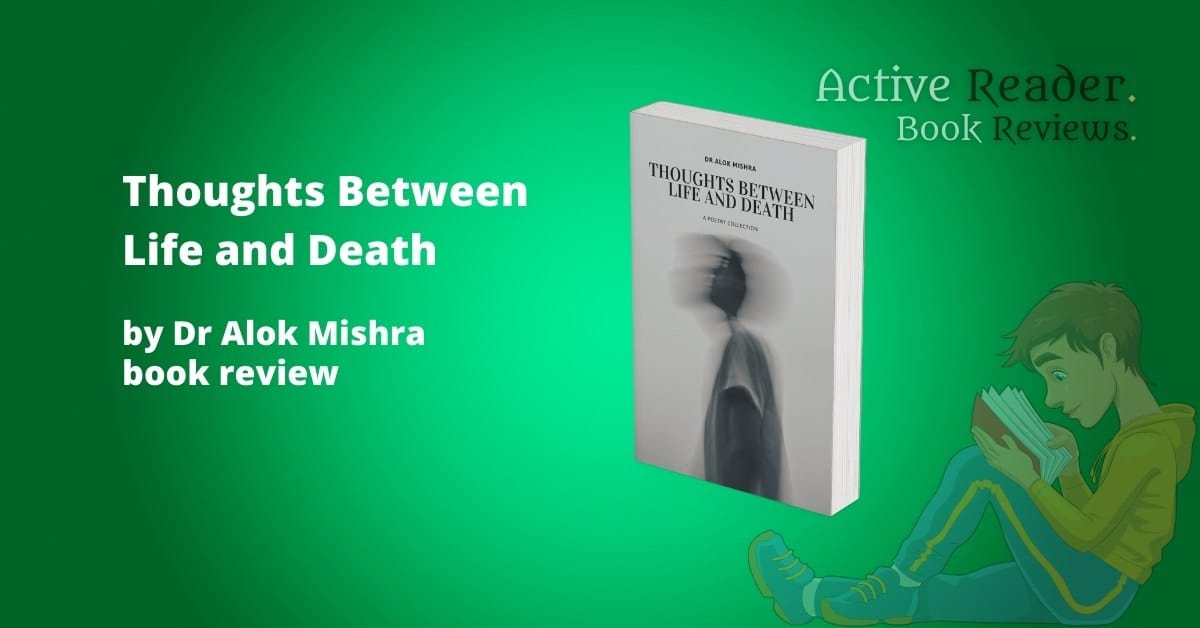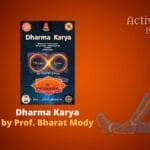Dr Alok Mishra’s Thoughts Between Life and Death emerges as a collection deeply invested in the existential paradoxes that bind human beings to both suffering and transcendence. In this volume, Mishra’s poetic voice oscillates between intimate confession and philosophical assertion, situating him firmly within the evolving canon of Indian English poetry, while also marking his distinct contribution to it. Where earlier poets such as Toru Dutt and Sarojini Naidu foregrounded the lyrical celebration of nature and patriotism, and Nissim Ezekiel and Kamala Das turned inward to urban realism and confessional intimacy, Dr Mishra navigates the metaphysical. His is a poetics that consistently searches for meaning in liminal spaces—between presence and absence, knowledge and ignorance, love and loss, life and death.
The strength of Mishra’s poetry lies not only in his philosophical concerns but also in the precision of his imagery. He does not indulge in abstraction without grounding it in a tactile, lived image. This fusion of clarity and profundity aligns him with a tradition of Indian poets who have resisted decorative excess while still aspiring to the metaphysical. The poems become sites where thought and feeling converge, where the intellect deepens rather than diminishes lyric resonance.
One of the finest examples of this convergence appears in his poem We Two Parted:
“When we two parted,
there was no agony
in either of the two
who lived all our lives together,
so close and near,
and so, so dear
one could hardly guess
one from the other.”
The language here is simple, almost conversational, yet the underlying emotion is profound. Unlike Byron’s famous poem of the same name, Mishra’s version refuses melodrama. There is no bitterness, no overt anguish. Instead, the absence of agony itself becomes the point of meditation. The intimacy described—so close that one could hardly distinguish between the two—speaks of a unity that transcends conventional notions of parting. Mishra suggests that love’s depth is measured not by emotional rupture but by its ability to efface the boundaries between selves. In the canon of Indian English love poetry, where Kamala Das frequently foregrounded pain, betrayal, and raw passion, Mishra’s perspective is strikingly serene. His handling of love reflects a philosophical detachment, aligning him more with Bhakti traditions where union is emphasised even in separation.
If love is rendered as serene continuity, time appears in the collection as a ruthless adversary. The poem The Lost Battle voices this tension between human desire and temporal inevitability:
“Time has wasted itself
doing absolutely nothing!
I only wish it could turn back
and bring me another opportunity
to experience and see,
fathom and breathe,
live with her and leave the world
on its own,
that night of passionate solitude.”
Here, Mishra personifies time as an entity that “has wasted itself,” an unusual inversion that shifts blame away from human failure onto time itself. The tone is simultaneously lamenting and accusatory. The speaker’s wish to “turn back” reflects an impossible longing, highlighting the futility of desire when confronted with the passage of time. The phrase “night of passionate solitude” beautifully fuses contradiction, suggesting a moment both filled with intimacy and charged with loneliness. In Indian English poetry, Jayanta Mahapatra has similarly explored the ravages of time on personal memory. Still, Dr Mishra adds a distinctive touch by turning solitude into a paradoxical site of passion. Time’s linearity is resisted through the circular return of memory, yet the futility of such resistance remains.
From love and time, the poet shifts toward the theme of justice, probing its elusive and often cruel logic. His poem Justice is both terse and haunting:
“A mother will die.
A child will be saved.
A serpent will always bite.
Beyond the sentimental values
we often inscribe
on whatever we can,
the jury and the executioner,
in this case, are one and the same,
and their perception of justice –
airtight!
Untouched by the melodrama.”
The starkness of these lines echoes classical gnomic verse, where truths are presented as axiomatic. Justice here is stripped of human sentimentality. The inevitability of the serpent’s bite underlines the idea that nature and the universe operate under laws indifferent to human values. The assertion that the “jury and the executioner… are one and the same” eliminates the possibility of appeal, rendering justice as final, airtight, and unsentimental. In the broader landscape of Indian English poetry, Mishra’s view diverges sharply from poets like Ezekiel, who often explored justice in socio-political or urban contexts. Mishra elevates the discussion to a cosmic level, insisting that human notions of fairness are irrelevant to the universe’s brutal impartiality.
Yet Mishra is not always stark; he can also be tender in his treatment of memory and belonging. The poem Watching Sunset, Under the Tree demonstrates this quality with layered poignancy:
“The evening is calm,
unbothered by the chaos inside me.
See. I sit under this tree every day,
in the evening and morning,
noon and night,
in darkness and in light.
It shadowed my mistakes,
impish sports and all the life lessons
I learnt swinging, climbing,
navigating this labyrinth called the world.”
The tree becomes both a literal and symbolic anchor for the speaker’s life. Its shadow shelters mistakes, joys, and lessons, functioning as a witness to human growth. The progression from morning to night parallels the human life cycle, suggesting that the tree embodies resilience and continuity in the face of change. Mishra’s evocation of the tree situates him within a lineage of Indian poets who have used nature not merely as background but as a living presence—Dutt’s Our Casuarina Tree comes to mind. Yet where Dutt emphasised nostalgia and loss, Mishra foregrounds continuity, recognising the inevitability of loss but affirming the tree’s resilience as a model for human endurance.
The final theme that stands out in the collection is Mishra’s meditation on knowledge and wisdom, often treated with scepticism. In And Regret, he writes with playful yet profound circularity:
“Only if I knew
that knowing it would bring
a burden I could seldom carry
and ferry among those I know,
only to be rejected.
Who knows what I know?
Do I know if they know?
Who knows all those who know?”
The repetition of “know” and “knows” creates a spiralling rhythm that mirrors the futility of epistemic pursuits. Knowledge is represented as a burden rather than a liberation, isolating rather than connecting. The poem borders on the aphoristic, yet its circularity denies closure, forcing the reader to remain within the loop of unresolvable questioning. This resonates with postcolonial critiques of knowledge articulated by theorists such as Gayatri Spivak and Walter Mignolo, who highlight how epistemic structures often conceal power and exclusion. Mishra’s poetic treatment, however, is less polemical and more existential, emphasising the personal burden of knowing.
Taken together, these five extracts reveal the thematic richness of Thoughts Between Life and Death. Mishra’s craft is marked by clarity of language, refusal of ornamentation, and a capacity to blend personal experience with universal reflection. His poems resist closure, often ending on notes of ambiguity that invite contemplation rather than deliver resolution.
In situating Dr Alok Mishra within the canon of Indian English poetry, one must acknowledge his distinctiveness. Like Ezekiel, he values clarity; like Mahapatra, he dwells on existential unease; like Toru Dutt, he invests natural imagery with profound symbolism. Yet he differs from them by structuring his entire collection around the liminal space “between life and death.” This is not merely a thematic gesture but a philosophical framework that governs the logic of his imagery and the trajectory of his reflections.
Mishra’s work expands the possibilities of Indian English poetry by proving that philosophical meditation can coexist with lyrical accessibility. His poems are neither esoteric nor overly didactic; they are meditative spaces where readers encounter paradox, silence, and profundity. In a globalised literary world where Indian poets in English often negotiate cultural translation, Mishra instead foregrounds existential universality, reminding us that poetry remains a human attempt to navigate the fundamental puzzles of being.
Thoughts Between Life and Death is thus not just a collection of poems but a philosophical journey. It asks readers to reflect on love without clinging, to confront time without illusion, to understand justice without sentimentality, to cherish memory without denial, and to accept knowledge as both gift and burden. In doing so, Mishra asserts himself as a significant voice in the contemporary canon, a poet who writes not merely from India but from the depths of the human condition.
You can get a copy from Amazon India Kindle Store: Get a copy now!
Review by Amit for Active Reader
(Thanks for reading!)
Thoughts Between Life and Death by Dr Alok Mishra, review of poetry collection
- Active Reader Rating
Summary
Dr Alok Mishra’s poetry offers diverse images to realise, feel, experience and ponder…



That’s some moving poetry… thanks for sharing this review. Expressions are profound, and yet the lyrics are free-flowing… keeping things simple and easily accessible for ordinary lovers of poetry.